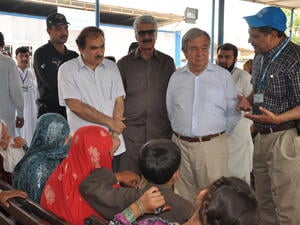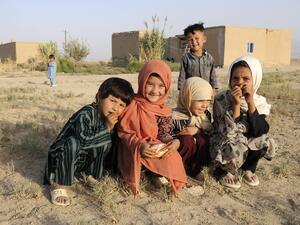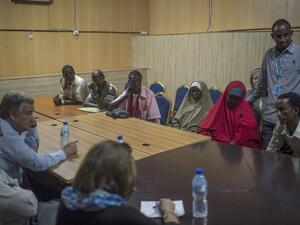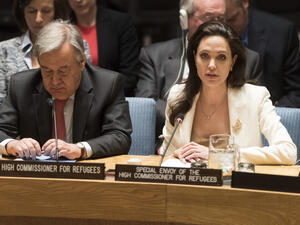UNHCR chief puts spotlight on Central African refugees in Cameroon
UNHCR chief puts spotlight on Central African refugees in Cameroon
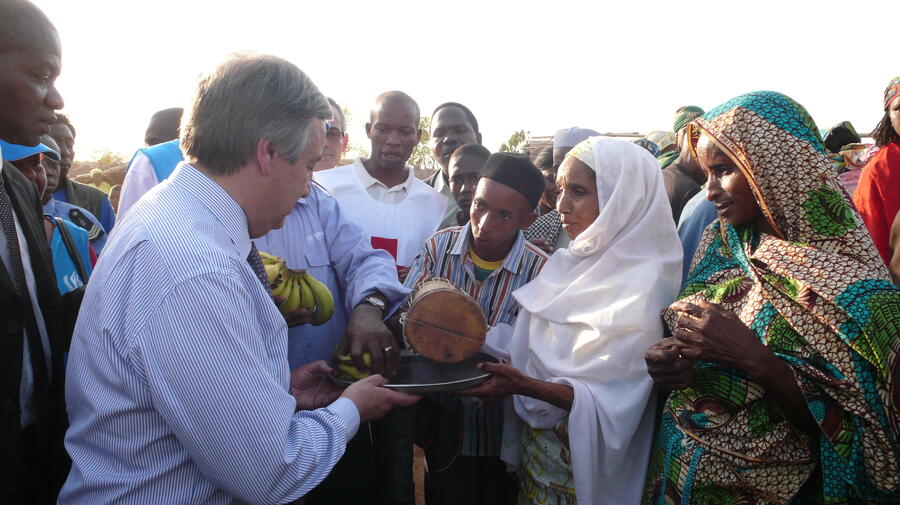
UN High Commissioner for Refugees António Guterres receives gifts - bananas and a small drum - from the Mbororo refugees in Bolembe.
BERTOUA, Cameroon, March 5 (UNHCR) - UN High Commissioner for Refugees António Guterres has visited Mbororo refugees from the Central African Republic in a bid to focus world attention on the "forgotten tragedy" of these people sheltering in Cameroon.
Guterres met and talked to some of the refugees during visits this week to Mandjou and Boulembe settlements, which are located 350 kilometres east of the Cameroon capital, Yaoundé, and together house some 3,000 refugees.
"I am here to show my gratitude to the people and government of Cameroon [for hosting more than 100,000 refugees and asylum-seekers from about 30 countries, including 80,880 from the neighbouring Central African Republic]," Guterres said during his visit to Mandjou, where he received a colourful welcome.
The High Commissioner stressed that he had also decided to visit the Central African refugees "to draw the attention of the international community to the forgotten tragedy of the Mbororo refugees." Guterres said he hoped that peace and democracy would be restored in their country, which he was due to visit from Friday.
The Mbororos are mainly nomadic cattle breeders from the west and north-west of the Central African Republic. Those fleeing to Cameroon since 2005 say that their people have been targeted by organized groups of bandits and rebels who steal their cattle and kidnap their women and children for ransom.
They live in dozens of settlements in eastern Cameroon, making it difficult for UNHCR staff based in the town of Bertoua to monitor their situation, register new arrivals and distribute aid. The government of Cameroon recognizes this population as prima facie refugees.
During his visit to the settlement at Bolembe, home to some 1,150 Mbororos, Guterres expressed his admiration for the refugees, who told him that they lived in peaceful co-existence with the local population. "We have been living together for several years, sharing water, classrooms and infrastructure," refugee Aliou Nassé told him.
Guterres also met Hadja Adama, a dignified mother of 11 with a harrowing story. Aged 45, she looks much older after a life of hardship. She fled to Boulembe five years ago with her children after her husband was killed in the Central African Republic by cattle rustlers. She now struggles to raise her children as well as the four offspring of her brother, who died suddenly after a short illness.
Guterres was clearly moved by her story. "It is a shame that such tragedy goes unnoticed. It is urgent to make the international community face its responsibilities. These people have gone through an unimaginable ordeal," he said. "And the end of the tunnel is not near because there is no sign that the security situation has improved enough for people to think about returning to the Central African Republic."
A UNHCR registration exercise conducted last October testified to a steady influx and an increase in the number of refugees from across the border over the previous year.
In Cameroon, their host country, problems also exist. The refugees and their host communities join their voices to complain about shortages of clean water, not enough classrooms and the distance of health clinics. "These are problems we are trying to solve with our limited resources," said Aida Haile Mariam, UNHCR's representative in Cameroon. "The High Commissioner's visit is an opportunity to further draw the attention of the international community to the plight of the Central African refugees."
Before heading to Central African Republic, Guterres held talks with senior Cameroonian officials, including President Paul Biya and Prime Minister Philemon Yang.
By Francis Kpatindé in Bertoua, Cameroon


